| Listing 1 - 10 of 23 | << page >> |
Sort by
|
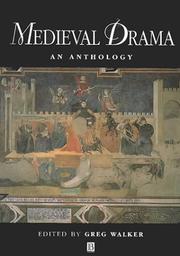
ISBN: 0631217274 0631217266 9780631217268 9780631217275 Year: 2000 Volume: *11 Publisher: Oxford: Blackwell,
Abstract | Keywords | Export | Availability | Bookmark
 Loading...
Loading...Choose an application
- Reference Manager
- EndNote
- RefWorks (Direct export to RefWorks)
Engelse moraliteiten --- Engelse mysterie- en mirakelspelen --- English moralities --- English mysteries and miracle-plays --- Interludes [English ] --- Interludes anglaises --- Interludia [Engelse ] --- Moraliteiten [Engelse ] --- Moralities [English ] --- Moralités anglaises --- Mysterie- en mirakelspelen [Engelse ] --- Mysteries and miracle plays [English ] --- Mysteries and miracle-plays [English ] --- Mystères et miracles anglais --- English drama --- Mysteries and miracle-plays, English --- Moralities, English --- Interludes, English --- Interludes, English. --- Moralities, English. --- Mysteries and miracle-plays, English. --- To 1500 --- Early modern and Elizabethan, 1500-1600 --- English miracle-plays --- English interludes --- English drama - To 1500 --- English drama - Early modern and Elizabethan, 1500-1600
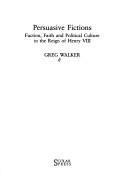
ISBN: 1859281397 Year: 1996 Publisher: Aldershot : Scolar Press,
Abstract | Keywords | Export | Availability | Bookmark
 Loading...
Loading...Choose an application
- Reference Manager
- EndNote
- RefWorks (Direct export to RefWorks)
English literature --- Persuasion (Rhetoric) --- Political parties --- Politics and literature --- Littérature anglaise --- Argumentation --- Partis politiques --- Politique et littérature --- History and criticism --- History --- Histoire et critique --- Histoire --- Great Britain --- Grande-Bretagne --- Politics and government --- Politique et gouvernement --- -Persuasion (Rhetoric) --- -Politics and literature --- -Literature --- Literature and politics --- Literature --- Parties, Political --- Party systems, Political --- Political party systems --- Political science --- Divided government --- Intra-party disagreements (Political parties) --- Political conventions --- Forensics (Public speaking) --- Oratory --- Rhetoric --- British literature --- Inklings (Group of writers) --- Nonsense Club (Group of writers) --- Order of the Fancy (Group of writers) --- -History --- -Political aspects --- Henry VIII, King of England --- Church history --- -Politics and government --- -English literature --- -History and criticism --- -Henry VIII, King of England --- Littérature anglaise --- Politique et littérature --- Henry --- Henricus --- Heinrich --- Enrique --- Henri --- Hendrik --- Enrico

ISBN: 0521374367 0521090725 0511897383 9780511897382 9780521374361 9780521090728 Year: 1991 Publisher: Cambridge Cambridge University Press
Abstract | Keywords | Export | Availability | Bookmark
 Loading...
Loading...Choose an application
- Reference Manager
- EndNote
- RefWorks (Direct export to RefWorks)
A detailed study of the interaction between drama and politics in the reign of Henry VIII. The subject is addressed both in general terms and through a series of case-studies of individual early Tudor plays. Through its innovative use of dramatic texts as historical source material, the book provides illuminating insights into the political and cultural history of the Henrician period, and into the perceived character of the King himself. It focuses on the troubled religious and political history of the reign, the culture of the Court, and the personality and governmental style of its head. In doing so the book argues for a reassessment of the reign, which places the King once more at the centre of affairs, and acknowledges the determining effect which this egotistical, charismatic but, above all, pragmatic monarch exercised on the artistic culture, as much as on the politics, of the Court. The book also demonstrates the close and specific links between the drama and the politics of the reign, through a detailed study of a number of key works, links which have hitherto been viewed only as general or peripheral.
Authors and patrons --- English drama --- Kings and rulers in literature --- Literary patrons --- Persuasion (Rhetoric) --- Political plays, English --- Politics and literature --- 820-2 "15" --- Rhetoric --- Forensics (Public speaking) --- Oratory --- History --- History and criticism --- Engelse literatuur: toneel; drama--?"15" --- Henry --- Henricus --- Heinrich --- Enrique --- Henri --- Hendrik --- Enrico --- Art patronage. --- In literature. --- Relations with courts and courtiers. --- Great Britain --- Court and courtiers --- Politics and government --- Drama --- English literature --- History of the United Kingdom and Ireland --- Henry, Prince [Wales] --- anno 1500-1599 --- Arts and Humanities --- Kings and rulers in literature. --- History and criticism.
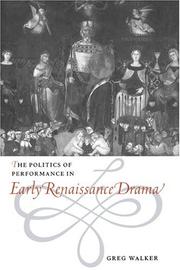
ISBN: 051158315X 0511005113 9780511005114 9780511583155 0521563313 9780521563314 9780521029919 0521029910 9780521029919 Year: 1998 Publisher: Cambridge : Cambridge University Press,
Abstract | Keywords | Export | Availability | Bookmark
 Loading...
Loading...Choose an application
- Reference Manager
- EndNote
- RefWorks (Direct export to RefWorks)
Greg Walker provides a new account of the relationship between politics and drama in the turbulent period from the accession of Henry VIII to the reign of Elizabeth I. Building upon ideas first developed in Plays of Persuasion (1991), he focuses on political drama in both England and Scotland, exploring the complex relationships between politics, court culture and dramatic composition, performance and publication. Through a detailed analysis of one central dramatic form, the interlude or great hall play, and close study of key texts, Walker examines drama produced and adapted for varying conditions of performance: indoor and outdoor, private and public. He examines what happened when the play script was printed and sold commercially as a literary commodity. This interdisciplinary analysis will find a market among Tudor historians as well as students of medieval and Renaissance drama.
Political and social views. --- English drama --- Theater --- Politics and literature --- Political plays, English --- Renaissance --- History and criticism. --- Political aspects --- History --- Lindsay, David, --- Heywood, John, --- Udall, Nicholas, --- Norton, Thomas, --- Great Britain --- Politics and government --- Dramatics --- Histrionics --- Professional theater --- Stage --- Theatre --- Performing arts --- Acting --- Actors --- Revival of letters --- Civilization --- History, Modern --- Civilization, Medieval --- Civilization, Modern --- Humanism --- Middle Ages --- Heywoode, John, --- Heiwood, John, --- Heywoode, Jhon, --- Heywood, J. --- Haywood, John, --- Haywoode, John, --- Heywod, John, --- Arts and Humanities --- Literature
Book
ISBN: 9780198851516 0198851510 0191886114 0192592297 0192592300 Year: 2020 Publisher: Oxford Oxford University Press
Abstract | Keywords | Export | Availability | Bookmark
 Loading...
Loading...Choose an application
- Reference Manager
- EndNote
- RefWorks (Direct export to RefWorks)
John Heywood was an important literary and theatrical pioneer in his own right, but he is also a revealing lens through which to view the wider tumultuous history of the sixteenth century. He was, through the period from the mid-1520s to the 1560s, as near to a celebrity as Tudor England possessed, famed for his 'merry' persona and good humour. But his public image concealed a deeper engagement with religious and political history. Enduringly resistant to extremism, he variously entertained, counselled, and cautioned his readers and audiences through four reigns, finding himself, as regimes changed and religious policies shifted, successively celebrated, marginalised, anathematised, condemned to death, recuperated, and celebrated once more before finally retreating into exile on the Continent in 1564. He produced plays at the courts of Henry VIII, Edward VI, Mary and Elizabeth, performed and taught keyboard music, wrote lyric poetry and songs, and from the mid-sixteenth century turned to collecting and publishing highly successful volumes of proverbs and epigrams for which he was remembered well into the seventeenth century. Each of these works provides a subtle, often courageously critical engagement with the politics of its moment. To study Heywood's career takes us beyond the cliches of popular history, beyond Shakespeare and the Elizabethan playhouses, beyond the canonical Henrician court poets and the writers of the Elizabethan 'Golden Age', beyond even the experiences of the century's chief ministers, intellectuals, and martyrs, to a theatrical and literary world less visible in the conventional sources. It opens a window on a culture in which the actions of monarchs, their councillors, and their victims were witnessed and reflected upon at one remove from the centres of power.
Heywood, John --- Heywood, John, --- Heywoode, John, --- Heiwood, John, --- Heywoode, Jhon, --- Heywood, J. --- Haywood, John, --- Haywoode, John, --- Heywod, John, --- Criticism and interpretation.
Book
ISBN: 9780748681020 0748681027 9780748681037 0748681035 9780748681044 0748681043 9780748681013 0748681019 9781299456587 1299456588 0748684433 Year: 2013 Publisher: Edinburgh : Edinburgh University Press,
Abstract | Keywords | Export | Availability | Bookmark
 Loading...
Loading...Choose an application
- Reference Manager
- EndNote
- RefWorks (Direct export to RefWorks)
How far should we try to read medieval and early modern texts historically? Does the attempt to uncover how such texts might have been received by their original readers and audiences uncover new, hitherto unexpected contemporary resonances in them? Or does it flatten works of art into mere 'secondary sources' for historical analysis? This book makes the case for the study of literature in context. It demonstrates the value of historical and cultural analysis alongside traditional literary scholarship for enriching our understanding of plays and poems from the medieval and early Tudor past and of the cultures which produced and received them. It equally accepts the risks involved in that kind of study.
English drama --- English poetry --- Historicism in literature. --- History and criticism.
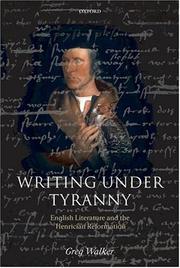
ISBN: 0199231974 9780199231973 Year: 2005 Publisher: Oxford: Oxford university press,
Abstract | Keywords | Export | Availability | Bookmark
 Loading...
Loading...Choose an application
- Reference Manager
- EndNote
- RefWorks (Direct export to RefWorks)
English literature --- Politics and literature --- Religion and literature --- Literature and state --- Authors, English --- Protest literature, English --- Reformation --- Reformation in literature --- England --- Great Britain
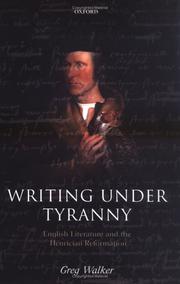
ISBN: 9780199283330 Year: 2005 Publisher: Oxford Oxford University Press
Abstract | Keywords | Export | Availability | Bookmark
 Loading...
Loading...Choose an application
- Reference Manager
- EndNote
- RefWorks (Direct export to RefWorks)
Digital
ISBN: 9780748681020 Year: 2013 Publisher: Edinburgh Edinburgh University Press
Abstract | Keywords | Export | Availability | Bookmark
 Loading...
Loading...Choose an application
- Reference Manager
- EndNote
- RefWorks (Direct export to RefWorks)
Digital
ISBN: 9780748681020 9780748681013 Year: 2022 Publisher: Edinburgh Edinburgh University Press
Abstract | Keywords | Export | Availability | Bookmark
 Loading...
Loading...Choose an application
- Reference Manager
- EndNote
- RefWorks (Direct export to RefWorks)
| Listing 1 - 10 of 23 | << page >> |
Sort by
|

 Search
Search Feedback
Feedback About UniCat
About UniCat  Help
Help News
News